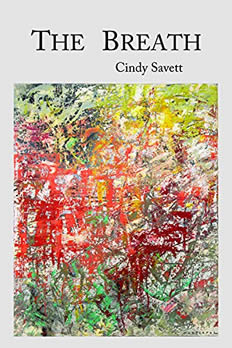
an SPD Recommends
selection
Published by BlazeVOX
2021
Available from your local independent bookstore or
from amazon.com.
You can also buy it directly from the publisher:
Paper, $16.00
. . . . . . . . . . . . . . . . . . . . .
Reviews
Cindy Savett’s new collection of poetry revisits the subject of her first book, Child in the Road, published in 2007, also a response to the sudden death of her young daughter, Rachel. The grief is still fresh, the mourning just as keen, the poetry just as lyrical. [read the full review here]
--Charles Rammelkamp
Compulsive Reader
It is said that to lose a child is to lose the future. But just a few pages in, this collection of poems, these illuminated memories and imaginings convinced me that Cindy Savett’s daughter was not lost to her when she died at the age of eight all those years ago. As long as Rachel “… lingers, sounds out / the curvatures of my breath / with her phantom tongue…” then she is as real as ever, her all too brief existence immortalised in the souls of those who loved her. And with that love, you feel their future is assured.
The Breath is a series, an arrangement of stuttering emotion and almost mythical imagery summoning the poet’s departed child and relating her sorrow in an even and considered way which only magnifies its intensity. It is both a quiet release of anguish and a heightened recollection, skillfully composed and with an overwhelming honesty that urges you on to discover more about Rachel and her abiding presence. [read the full review here]
--Robert Dunsdon
Lit Pub
. . . . . . . . . . . . . . . . . . . . . .
Cindy Savett’s The Breath is a riveting meditation on grief and resilience. Savett’s vivid, resonant poems create a language for renewal out of the urgent “phantom tongue” of loss. The Breath casts an honest, empathetic eye on the grief process, leading us, achingly, “into the stable of vanished gods” and encouraging us to “pace / within the flame” of absence--to reimagine loss as a transformative practice that can redeem the “hush / left behind.”
--Tony Trigilio,
author of The Complete Dark Shadows (of My Childhood), Book 1
The figure of the beloved in these spare, lyrical poems of mourning is a young daughter, a "bird child who choreographed my murmuring lips," whose absence returns the poet to a state of spiritual and linguistic prima materia: a "wasteland of irony," clay breath, and orphaned wolves. And yet from these elegiac archipelagos comes incantations so tender and haunting that they reanimate the very subject of lyric address ("O you, my pilgrim, my vein"), and transform the speaker, as she becomes both her child and a postlapsarian creator, awaiting from within a "stable of vanished gods" the "rise to mercy's debris.”
--Virginia Konchan,
author of The End of Spectacle
Shattered is the word that defines this book. At its center is the death of a child, and that shattering extends beyond the child to the mother, beyond the mother, to the father, their marriage, the son, and the other daughter. What pieces belong to each is a question and a puzzle. The glue that holds it all together is the breath--the fact that you are continuing to breathe not just for yourself but for all the others both living and dead. This is Cindy Savett's second book about her daughter's death. You will find shards of poems sticking to your psyche for weeks.
--Fran Quinn
author of The Horse of Blue Ink
The Breath is a sequence, not so much of elegies, but--as an old Catholic prayer has it--of “sighs, mourning, and weeping in this valley of tears.” Rachel, Cindy Savett’s daughter who died at eight years old over two decades ago, has become the muse of her eerily surreal poetry. The poet keeps addressing the daughter, the daughter keeps replying. Savett says, "I tightly drape you in my lament, trade / your ruin for how I yearn." This yearning and the poems themselves, filled with infinite silence between electric line breaks, become the way that the poet paradoxically keeps her daughter close to her, alive and breathing. These poems are exhalations and inhalations. The Breath is, ultimately, nothing less than a necessary act of salvation for both mother and daughter.
--Donald Platt,
author of One Illuminated Letter
of Being
. . . . . . . . . . . . . . . . . . . . . . . . .